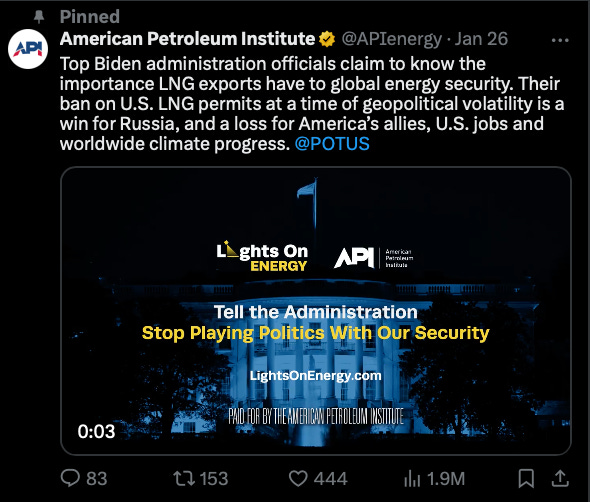Understanding Biden's LNG decision
There's a lot of politically-motivated misinformation floating around about it. Here's what's really happening.
There’s a lot of misinformation floating around about the Biden Administration’s decision on Friday to temporarily pause Department of Energy permit approvals for new liquified natural gas, or LNG, export terminals.
Most of this misinformation is coming from Republicans and the fossil fuel industry, but some Democrats and environmental groups are stretching the truth too. Republicans are fear-mongering about how awful Biden’s decision is for the economy and energy security, and Democrats are exaggerating how great it is for the climate.
The reason each group is overstating the importance of this move is because they want to fire up their respective voter bases. Democrats are trying to motivate progressives to vote for Biden in the upcoming president election, and Republicans want to rage-bait conservatives to vote against him.
It’s all to be expected, but it’s not really helping anyone understand what’s actually happening. So here’s how to understand Biden’s new LNG policy without the political spin.
The reality of Biden’s LNG decision
First thing’s first: The Biden Administration did not block the export of LNG to other countries, nor did he pause the construction of new LNG export facilities.
No existing LNG facility in the U.S. is affected by this decision. The eight existing LNG export terminals around the country will continue to operate. The flow of fossil fuels overseas will continue.
Not only will the flow of U.S. LNG overseas continue—it will massively expand. None of the 10 new LNG export facilities that are already approved by the Department of Energy are affected by Biden’s decision. With these approved and under construction facilities, the volume of U.S. LNG exported to other countries is expected to double by 2028.
Here’s what the Biden Administration actually did: It put a temporary pause on granting Department of Energy approvals for proposed new LNG export facilities.
That’s a bit of a mouthful, which is one reason why you don’t see it in headlines and social media posts. Instead, you see things like, “Biden took action to stop LNG” or “White House makes historic move to block fossil fuels.”
It’s understandable, but those simplified framings can easily give the impression that the White House did more than it actually did. Because the only LNG facilities affected by this policy are the ones that fossil fuel companies have said they are planning to build, but have not yet obtained DOE permits for.
To be sure, this is still a good number of facilities. There are at least six major proposed LNG export terminals affected by the pause. If the Biden administration had not issued this pause, these facilities would have sailed through the normal DOE approval process, and ensured future greenhouse gas emissions equal to 317 coal plants, according to the Guardian.
That’s why climate activists are celebrating, and it’s a good reason. Because now, in response to their pressure, the White House has pledged to revamp the DOE’s permit-granting process to consider the latest and best-available science on climate, economic, and security impacts. That means fossil fuel companies may no longer get automatic, rubber-stamped approved to build new LNG infrastructure in the Gulf of Mexico.
The key word in that last sentence, however, is may. Because the fact is, we still don’t know how long this pause will last, what this new DOE approval process will look like, or how many of the affected projects will be accepted or rejected. As Bloomberg aptly noted on Sunday: “If reelected, Biden might very well allow the process to move forward once safely back in office for another four years.”
For the climate-concerned readers here (which I assume is most of you), I want to emphasize: I’m not laying this out for the purpose of downplaying activists’ accomplishments. I’m laying it out to urge an accurate understanding of what’s happening, and to caution against politically-motivated messaging that implies this fight is over, or that these emissions are guaranteed to never reach the atmosphere.
Yes, a battle has been won—and it’s a battle that never would have seen the light of day under a Trump administration, or any Republican administration. Yes, it is evidence that under Biden, the needle can be moved. And yes, it is probably the most significant thing a U.S. president has ever done to stand up to the fossil fuel industry.
But it is not, as the White House asserted on Friday, an example of “act[ing] with the urgency [the climate crisis] demands to protect the future for generations to come.” That simply has not happened yet. Whether it does happens still remains to be seen. And unless the pressure remains high, it very well may not.
Debunking industry myths about the LNG pause
Now that we’re through all that, let’s debunk a few Republican- and fossil fuel industry-led talking points about Biden’s LNG decision.






